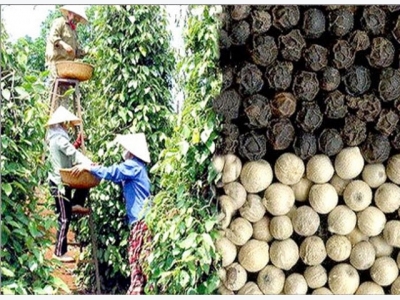Pepper exports expect to regain growth

Vietnam pepper exports increased by 20.5% to 214,000 tons in 2017, but the value dropped by 22% to US$1.12 billion after the export price fell 34.7% against the previous year.
Domestic price fell from VND200,000 per kilo in 2016 to VND70,000 per kilo in 2017. This is a sign of market saturation which suggests that the low price will remain in 2018 as the world pepper output is rising while pepper growing area in Vietnam is 50% larger than plan.
Local reports say climate change and extreme weather have negatively affected pepper production. Pepper output in 2018 is predicted not to go up and even decrease by 10% and the export volume will also be lower than last year.
Experts have attributed the growth of 20.5% in pepper export volume last year to the increase in world demand. However, they also explain that the gap between supply and demand is not large and after demand is met it will hinder supply.
Experts suggests that the Ministry of Industry and Trade provide businesses with more forecast information about markets, crops and the outputs of top pepper producing countries. The Vietnam Pepper Association (VPA) should play a better role in the task.
Tran Duc Tung, a representative of VPA, says India’s increase of import duties on pepper will slightly impact Vietnam exports as the market only accounts for around 7% of Vietnam’s total pepper exports.
Vietnam pepper has been shipped to more than 100 countries and territories in the world with three largest consumers as the US, India and the UAE. Vietnam pepper has been favoured by customers for decades having made inroad into different continents.
Meanwhile, pepper growers are trending towards organic farming and sustainable agriculture to be accepted by demanding markets such as the US and EU. It is expected that Vietnam pepper exports will regain its steady growth.
Có thể bạn quan tâm
 Agro-forestry-aquatic product exports hit 10.8 billion USD
Agro-forestry-aquatic product exports hit 10.8 billion USD The export value of agro-forestry-aquatic products reached 10.8 billion USD in the first four months of 2017
 Vietcombank to lend VNĐ60 billion to egg processing plant
Vietcombank to lend VNĐ60 billion to egg processing plant Vietcombank lent Việt Nam’s leading egg supplier Ba Huân Company Ltd VNĐ60 billion (US$2.6 million) to build a high-tech egg processing plant in Hà Nội.
 Prime Minister requests to enhance the rice exports
Prime Minister requests to enhance the rice exports The Prime Minister assigns ministries and sectors under their assigned functions and tasks to synchronously implement solutions to enhance the rice exports
 Japan leads agriculture trade mission to Vietnam
Japan leads agriculture trade mission to Vietnam A contingent of representatives from Japan held trade talks with members of the Ha Nam Province People’s Committee on April 26 focused on promoting
 Local business imports nearly 1,800 Australian cows
Local business imports nearly 1,800 Australian cows A business in the Mekong Delta province of Can Tho has imported 1,768 cows from Australia to supply beef at competitive prices to HCM City